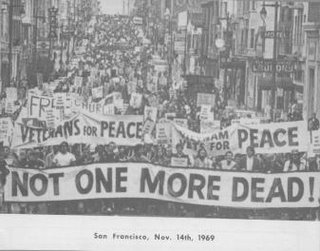 On September 10th, The Oregonian published a story by reporter Seth Prince under the headline "Once a protester, now a supporter of troops." The story itself was an account of the purported transformation of a former protester against the Vietnam and Iraq wars into a "supporter of the troops," as if those were mutually exclusive positions.
On September 10th, The Oregonian published a story by reporter Seth Prince under the headline "Once a protester, now a supporter of troops." The story itself was an account of the purported transformation of a former protester against the Vietnam and Iraq wars into a "supporter of the troops," as if those were mutually exclusive positions.It's unlikely that Mr. Prince wrote the headline, and there was little hint that he considered any of the implications of his story. But the headline and his story combined to offer yet another variation on a nauseatingly familiar theme: war protesters don't support the troops in Iraq, encourage their enemies and undermine morale.
This is a classic straw-man argument: those who oppose the war necessarily, and even deliberately, undermine our troops. Fortunately, a majority of American voters have now rejected George Bush's manipulative suggestion that questioning the war endangers the troops in Iraq.
Over the last forty years, I've attended numerous demonstrations against the wars in Vietnam and Iraq, and at each one the overwhelming majority of protesters expressed unequivocal support for American troops while challenging the flawed policies and assumptions that placed them in harm's way. In my experience, admittedly a long series of anecdotes, nearly all antiwar marches were led by protesters holding a large banner that read "Support Our Troops - Bring Them Home Now" (or some variation of that sentiment).
This is not to deny that some U.S. troops have demonstrably participated in atrocities, both in Vietnam and Iraq. Still, I have yet to hear an opponent of either war express anything short of full support for American troops and a strong desire to bring them home quickly and safely. The real lack of support has come from the Bush Administration, which has provided nothing to the troops but flawed assumptions, inept leadership and inadequate forces and equipment.
We can only hope that returning veterans of the Iraq and Afghan conflicts will receive better treatment from politicians, the Veteran's Administration and their fellow citizens than their predecessors in Vietnam, who faced widespread indifference.
Yet the myth persists that the worst abuses of Vietnam veterans came from war protesters, who purportedly spat on them and called them "baby killers" at airports when they returned home. In Rambo: First Blood (1982), the title character states at one point that he returned home from the war and saw "all those maggots at the airport, protesting me, spitting on me, calling me a baby killer..."
Even if such incidents occurred, I'm convinced that they were extremely rare. Bob Greene, a veteran, claims to have documented 63 spitting incidents in The Homecoming, his 1989 book. But the underground newspapers of that period are full of articles and letters expressing unqualified sympathy and support, to the extent of providing assistance to AWOL soldiers and deserters (like at Portland's Shelter Half).
Other journalists have taken a close look at this question and concluded that the "trashing" of the troops never happened at all. Chris Clarke, in an angry article for Counterpunch in 2003, called the myth a "damned lie." In his 1998 book, The Spitting Image, Vietnam Veteran Jerry Lembcke confronted the myth directly and found no evidence whatsoever to support it, concluding that it's an urban legend.
Perhaps researchers will eventually determine whether Vietnam veterans were, in fact, confronted or abused by antiwar activists--and if so, on what scale. Popular films like Rambo, The Deer Hunter and Forrest Gump seemed to help create a false historical memory that has evolved into a common assumption, perpetuated primarily by the right, that is intended to drive a permanent wedge between the antiwar movement and the rest of the country. The result is a myth that has little or no factual basis and is, to many of us who challenged the war, deeply offensive.
Meanwhile, such tired arguments from four decades ago continue to be thrown in the face of those who oppose the Iraq war while supporting the U.S. troops who wage it. George W. Bush partied through the Vietnam war—at least when he wasn't campaigning for Republicans—and Dick Cheney had "other priorities," as he admitted. So the rest of us, especially our troops in Iraq and their families, have to pay the price while they relearn the lessons—and repeat the mistakes--of forty years ago.

1 comment:
What I find particularly troubling about seeing headlines and articles like this is that I don't think the journalists involved even realize they're saying something that anyone would disagree with or take issue with in any way. The propaganda here is so thick and constant it's become unconscious. Only through decades of repetition can something so utterly false become this assimilated into our everday discourse.
Thus, not supporting a particular idea--that we must invade and occupy Iraq, say--can somehow come off as something that it literally has no connection to whatsoever: not supporting "the troops," in the sense of the actual individual people serving in the military. Even if belief in the hawkish cause was a prerequisite for joining the military, this still wouldn't make any sense. You don't have to agree with what someone's doing (or being forced to do) to "support" them. In fact, disagreement of this kind is frequently the strongest form of support. Consider what it means to "support" a friend with an addiction...
Post a Comment